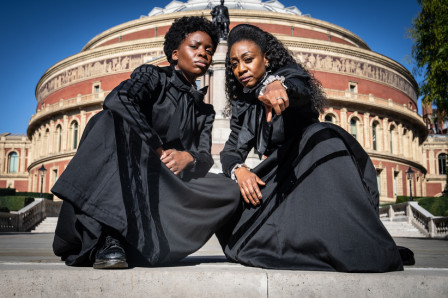Review: AMADEUS at The National Theatre
 Following its massive success last year, Peter Shaffer’s legendary AMADEUS returns to the Olivier’s Stage at The National Theatre. Whether you are a fan of Miloš Forman’s film adaptation of Shaffer’s play, or you’ve never heard of the play before, you will not be disappointed by Michael Longhurst’s visually striking story of jealousy, genius and music.
Following its massive success last year, Peter Shaffer’s legendary AMADEUS returns to the Olivier’s Stage at The National Theatre. Whether you are a fan of Miloš Forman’s film adaptation of Shaffer’s play, or you’ve never heard of the play before, you will not be disappointed by Michael Longhurst’s visually striking story of jealousy, genius and music.
Antonio Salieri (Benedict Msamati) is dying, or at least that’s what he is telling us. On his deathbed he begins to feel remorse; its pain overtaking his body and mind. The Italian composer is convinced that his jealousy and ambition was the reason behind Wolfgang Amadeus Mozart’s (Adam Gillen) premature death. And so Salieri takes the audience on a journey; a journey through music, madness, rivalry, laughter, and unavoidable tragedy.
If you expect period drama from this piece set in 18th and 19thcentury Vienna, be assured that this is not what Michael Longhurst constructs during this three hour spectacle. Firstly, there is a grunge nonchalance and rockabilly sense of aesthetic that is so well incorporated into the piece by the designer. Chloe Lamford, whose previous work with Katie Mitchell and Robert Icke, tells you a lot about her sense of freedom and bravery. Young “Wolfie” parades around the Emperor’s court wearing pink Dr. Martens, whilst Salieri pulls off a sparkly gold outfit. This, no doubt a European influence, makes Lamford one of the most exciting young designers in the country.
Longhurts is a visionary. He takes Shaffer’s story and makes it his own, whilst completely luring the audience in. The use of a 20 piece orchestra, made up of members of the Southbank Sinfonia, is simply breathtaking. Longhurst does not only use the musicians to create a beautiful sound to support the production, but he also integrates their physical presence into the piece. One minute they are there playing MAGIC FLUTE, a few minutes later they are the haunting figures, driving Mozart to madness, pushing Salieri to the edge.
Benedict Msamati’s portrayal of Antonio Salieri is simply breathtaking. His interpretation of jealousy, constant fear of mediocrity and the poisonous need to win the imaginary competition, make his performance not only complex but also painful to watch, as his humanity does not disappear under those layers of ambition and anger. Adam Gillen Wolfie is a genius in a child’s body. However Gillen’s Mozart is not just a spoiled and mad genius, but also a lost and socially inept vulnerable young man. His understanding of Mozart is not just a depiction of a cliché of madness but a possible study of autism, or even borderline personality disorder. There is a beautifully nuanced performance from Adelle Leonce who plays Constanze, Amadeus’ wife. Ahead of her time, she is the woman who does not care about societal expectations and tries to constantly navigate between her husband’s ego and genius.
AMADEUS is a spectacular production and I could easily write a much longer review in its praise. Longhurst has created a feast for all senses, but at the same time he has not fallen into the trap that so many directors who try to steer away from a traditional and British form of storytelling fall into: he still maintains the spirit and context of the play whilst engaging with young and vibrant audiences.
Latest News

 SYLVIA Releases First Single, 'March Women March'
4 March 2026 at 17:04
SYLVIA Releases First Single, 'March Women March'
4 March 2026 at 17:04

 Full cast and creative team announced for World Premiere of PLEASE PLEASE ME
4 March 2026 at 16:18
Full cast and creative team announced for World Premiere of PLEASE PLEASE ME
4 March 2026 at 16:18

 Rehearsal Images Released for JAJA'S AFRICAN HAIR BRAIDING at Lyric Hammersmith Theatre
4 March 2026 at 15:05
Rehearsal Images Released for JAJA'S AFRICAN HAIR BRAIDING at Lyric Hammersmith Theatre
4 March 2026 at 15:05

 STICK MAN returns to London for 15th run this festive season
4 March 2026 at 12:06
STICK MAN returns to London for 15th run this festive season
4 March 2026 at 12:06
